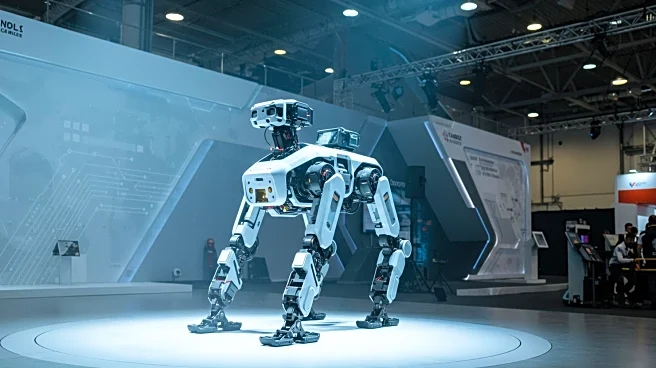What's Happening?
Unitree Robotics, a company based in Hangzhou, has emerged as a significant competitor to Tesla's Optimus robot during the first World Humanoid Robot Games held in Beijing. The event, which lasted three days, featured 280 teams from 16 countries, highlighting China's ambition to become a leader in the robotics industry. Unitree's H1 robot notably won a 1,500-meter race, completing it in 6 minutes and 35 seconds, surpassing many human runners. Additionally, Unitree's robots excelled in the 4x100-meter relay. The competition included various events such as soccer, martial arts, dance, and kickboxing, showcasing the diverse capabilities of humanoid robots. Despite the progress, the event revealed that the robotics field is still developing, with some machines experiencing technical difficulties during races and soccer matches.
Why It's Important?
The World Humanoid Robot Games underscore China's strategic focus on developing a world-class robotics industry by 2027. This initiative is significant as it positions China to potentially surpass U.S. competitors in the robotics sector. The event also highlights the growing interest from major firms in robotics as a lucrative market. Nvidia's CEO Jensen Huang has projected the field to evolve into a multi-trillion-dollar industry, while Tesla's CEO Elon Musk envisions his Optimus robot generating substantial revenue. As the industry progresses, investors are keenly observing the development of robots' capabilities and the competitive positioning of companies like Unitree, which are advancing rapidly.
What's Next?
China plans to continue hosting events like the World Humanoid Robot Games annually, further promoting the development of its robotics industry. The government aims to integrate robots into various job tasks, such as hotel service and factory work, which are crucial for future adoption. As the sector evolves, stakeholders will monitor how quickly robots can perform tasks autonomously and the strategic moves by companies to lead in this emerging market.
Beyond the Headlines
The push for a leading robotics industry in China raises ethical and cultural considerations, particularly regarding the integration of robots into everyday life and the workforce. The development of autonomous robots also poses legal challenges, including liability issues and regulatory frameworks that need to be addressed as the technology advances.










